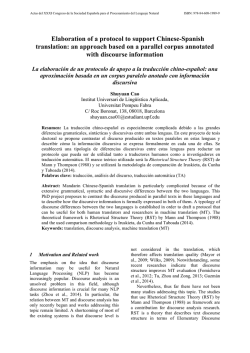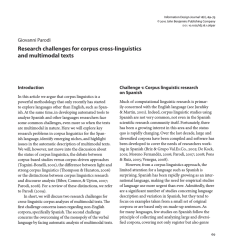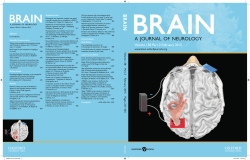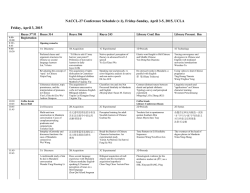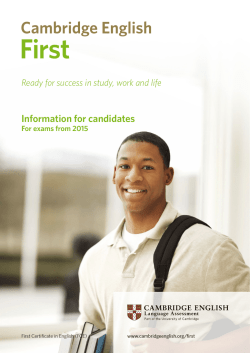
OLL 231: DISCOURSE ANALYSIS - The Open University of Tanzania
THE OPEN UNIVERSITY OF TANZANIA Faculty of Arts and Social Sciences P.O. Box 23409 Tel: 255-22-2668820/2668992-Ext.2115 Dar Es Salaam Fax: 255-22-2668759 http://www.out.ac.tz Direct Line: 022 - 2667255 E-Mail: [email protected] OLL 231: DISCOURSE ANALYSIS ACADEMIC YEAR 2014/2015 Course Title: DISCOURSE ANALYSIS Date of Official Course Code Approval: OLL 231 Academic Year: 2014/2015 Course Description The general goal of this course is to introduce students to the discipline called Discourse Analysis, as a field of study. The course is designed to help the students understand the intricate relationship between the linguistic and paralinguistic content of human behaviour. They will learn about how the discipline originated and the different theories and methods of Discourse Analysis. They will be taken through the major topics in Discourse Analysis, especially that which have to do with spoken discourse, such as Ethnomethodology and Conversational Analysis. Examine approaches to analyzing written discourse, Information and Thematic Structures, thematic progression in text and cohesion and coherence in written texts. It will also focus on utterance meaning and therefore, look at some basic Pragmatic principles, such as Presupposition, Implicature, Entailment, Speech Acts, Cooperative principle and Politeness Principle. Lastly, It will deal with recent approaches to Discourse Analysis, how discourse functions in some specific human endeavour and how it is related to other disciplines. Keywords: Discourse Analysis: major concepts 1 and kinds, Ethnomethodology, Conversational Analysis, Linguistic Anthropology, Information Structure/ Thematic Structure, Thematic progression, The Birmingham School Approach, Text Linguistics, Grammatical Cohesion, Lexical Cohesion, Pragmatics, Speech Acts, Cooperative Principles, Politeness Principles, Critical Discourse Analysis, Discourse in Use, Discourse and Other Disciplines. Dr. Hanna J.M. Simpassa Course Leader Course Tutors External To be Identified by the Department Examiner Dr. Hanna J.M Simpassa TWO UNITS Course Value Type Level Credit/Units Learning Hours CORE 2 2 45 lecture hrs. Assessment Marking Scheme Assessment Marking Criteria Assignment Submission Compensatable Delivery Mode To be provided by the Course Instructor The assessment will be based on Tutor marked Test done January/February and a Final Examination done in June/July. Portfolio Assessment by Instructor(s) during face to face sessions. NILL OPEN AND DISTANCE LEARNING 2 Other Requirements The main course-book: Malcom Coulthard, (1975). Discourse Analysis Additional Comments In Distance learning the study units replace the classroom lectures. Students read the lectures instead of listening to the lecturer. Course Aims: The course aims at: (i) Introducing students to the study of discourse; (ii) Familiarizing students with the major concepts in Discourse Analysis; (iii) Helping students understand the relationship between discourse and the social world; (iv) Exposing the students to the basic principles that guide human conversation; (v) Showing how cultural and general norms for human behaviour help to shape discourse. Learning Outcomes ) Knowledge & Understanding On successful completion of this course, the student will be able to: . (a) Define the major concepts used in Discourse Analysis; (b) Describe the different kinds and theories of Discourse Analysis (c) Demonstrate an understanding of the basic Pragmatic principles of Discourse Analysis. (d) Examine the approaches to analyzing written and spoken discourse. (e) Show how discourse is used to enact and resist power. Generic Cognitive & Intellectual Skills On successful completion of this course, the student will be able to demonstrate: ability to Explain how Discourse Analysis originated; 3 ability to describe the relationship between discourse and the social world; ability to discuss the basic principles that guide human conversation, ability to Examine the different approaches used to analyse discourse. Practical knowledge /Professional Skills On successful completion of this module, the student will be able to demonstrate: Ability to Analyse discourse using the different frameworks of DA, such as the Birmingham School; Approach, The Prague School Approach, Text Linguistics, Pragmatics and Critical Discourse Analysis. Key Transferable Skills Practice analysing various types of discourse critically using the frameworks learned in this course Indicative Content 1. Discourse Analysis: An Introduction 2. Major Concepts in Discourse Analysis 3. Kinds of Discourse 4. Ethnomethodology 5. Conversational Analysis 6. Linguistic Anthropology 7. Information Structure/Thematic Structure 8. Thematic Progression 9. The Birmingham School Approach 10. Text Linguistics 11. Grammatical Cohesion 12. Lexical Cohesion 13. Pragmatics: An Introduction 14. Speech Acts 15. Grice’s Cooperative Principles 16. Politeness Principles 17. Critical Discourse Analysis 18. Discourse in Use (Discourse and the Media) 19. Discourse in Use (Discourse and Society) 20. Discourse and Other Disciplines Learning Strategy: Reading the lecture notes and answering within lecture exercises, consulting some reading materials cited in the bibliography for a deeper understanding of the topics; consulting the course instructor for clarification of any difficult areas. Assessment Strategy: Checking on student portfolio, tests and exams 4 Assessment Criteria One Timed test = 30%; One examination = 70% TOTAL 100% A EXCELLENT 70% - 100% B+ VERY GOOD 60% - 69% B GOOD 50% - 59% C SATISFACTORY 40% - 49% D MARGINAL FAIL 35% - 39% E ABSOLUTE FAIL 0% - 34% Indicative Resources labs, specialist equipment, indicative reading Basic Readings Austin, J.L. (1962). How to do Things with Words. Cambridge, Mass: Harvad University Press. Brazil, D. (1977). The communicative Value of Intonation in English. Cambridge: CUP. Bloor, T. and Bloor, M. (1995). The Functional Analysis of English, A Halidayan Approach. London: Arnold. Brown, G. and Yule G. (1983). Discourse Analysis. Cambridge: CUP. Duranti, A. (1997). Linguistic Anthropology. New York: Cambridge University Press. Duranti, A. (1988). “Ethnography of Speaking: Toward a Linguistic of praxis” In F.J. Newmeyer ed. (1988). Linguistics: The Cambridge survey, Vol. IV. Language: The Socio-Cultural context. Cambridge UP. Johnstone, Barbara (2002). Discourse Analysis. Blackwell Publishers Halliday, M.A.K. (1976). Cohesion in English. London:Longman. Halliday, M.A.K. and Hasan, R.. & Hassan, R. (1985). Language. Context and Text: aspects of language in social- semiotic perspective. Oxford: OUP. 5 Halliday, M.A.K. (1985). Spoken and Written language. Victoria: Deakin University Leech, G. N. (1983). Principles of Pragmatics. Longman. Poore,S.(2000). Ethnomethodology. In A. Giddens, J.H. Turner, (eds) Social theory today. Cambridge: Polity Press 224-72. Psathas, George (1995). Coverasational Analysis. Thousand Oaks: Sage. Romaine, Suzanne. (1994). Language in Society: An Introduction to Sociolinguistics. London: Blackwell. Sacks, H. (1992). Lectures on conversation. 2vols. Edited by Gail Jefferson with introductions by Emmanuael A. Schegloff. Oxford: Basil Blackell. Saville-Troike, M.O. the Ethnography of Communication: An Introduction. Blackwell. Sinclair, J and Coulthard, M. (1975). Towards an Analysis of Discourse, The English used by Teachers and Pupils. Oxford: OUP. Searle, J. (1969). Speech Acts: An Essay in the Philosophy of Language. New York, Cambridge University Press. Taiwo, R. (2003) “Information Structure and Thematic Structure.” In Lekan Oyeleye and Moji Olateju (eds). Readings in Language and Literature. Ile- Ife OAU Press (87-101). Ten have, Paul (1999). Doing Conversational Analysis. Thousand Oaks: Sage. Yule G. (1996) . Pragmatics. OUP. 6
© Copyright 2026
